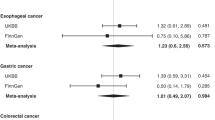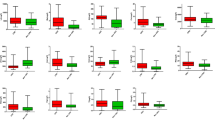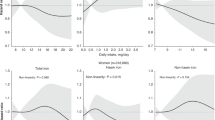Abstract
Background:
Folate, a water-soluble B vitamin and one of the major micronutrients in vegetables, is known as an essential factor for the de novo biosynthesis of purines and thymidylate, and it plays an important role in DNA synthesis and replication. Thus, folate deficiency results in ineffective DNA synthesis, and has been shown to induce the initiation and progression of colorectal cancer (CRC). Recently, the incidence of CRC in Korea has increased markedly in both men and women; this trend may be related to the adoption of a more ‘westernized’ lifestyle, including dietary habits.
Objective:
A hospital-based case–control study was conducted to examine the relationship between folate intake and the risk of CRC within a Korean population.
Methods:
A total of 596 cases and 509 controls, aged 30−79 years, were recruited from two university hospitals. Site- and sex-specific odds ratios (ORs) were estimated using logistic regression models.
Results:
Cases were more frequently found to have a family history of CRC among first-degree relatives, to consume more alcohol, to be more likely current smokers and less likely to participate in vigorous physical activity than the controls. In the overall data for men and women combined, multivariate ORs (95% confidence interval (CI), P for trend) comparing the highest vs the lowest quartile of dietary folate intake were: 0.47 (0.32–0.69, <0.001) for CRC, 0.42 (0.26–0.69, <0.001) for colon cancer and 0.48 (0.28–0.81, 0.007) for rectal cancer. An inverse association was also found in women with dietary folate intake: 0.36 (0.20–0.64, <0.001) for CRC, 0.34 (0.16–0.70, 0.001) for colon cancer and 0.30 (0.12–0.74, 0.026) for rectal cancer, but not in men. In addition, the total folate intake of women was strongly associated with a reduced risk of rectal cancer (OR, 0.38; 95% CI, 0.17–0.88; P for trend=0.04).
Conclusion:
We found a statistically significant relationship between higher dietary folate intake and reduced risk of CRC, colon cancer and rectal cancer in women. A significant association is indicated between higher total folate intake and reduced risk of rectal cancer in women.
This is a preview of subscription content, access via your institution
Access options
Subscribe to this journal
Receive 12 print issues and online access
$259.00 per year
only $21.58 per issue
Buy this article
- Purchase on Springer Link
- Instant access to full article PDF
Prices may be subject to local taxes which are calculated during checkout
Similar content being viewed by others
References
Ainsworth B, Haskell W, Leon A, Jacobs Jr D, Montoye H, Sallis J (1993). Compendium of physical activities. Med Sci Sports Exerc 25, 71–80.
Benito E, Stiggelbout A, Bosch FX, Obrador A, Kaldor J, Mulet M et al. (1991). Nutritional factors in colorectal cancer risk: a case–control study in Majorca. Int J Cancer 9, 161–167.
Bingham SA, Norat T, Moskal A, Ferrari P, Slimani N, Clavel-Chapelon F et al. (2005). Is the association with fiber from foods in colorectal cancer confounded by folate intake? Cancer Epidemiol Biomarkers Prev 14, 1552–1556.
Bollheimer LC, Buettner R, Kullmann A, Kullmann F (2005). Folate and its preventive potential in colorectal carcinogenesis. How strong is the biological and epidemiological evidence? Crit Rev Oncol Hematol 55, 13–36.
Boutron-Ruault MC, Senesse P, Faivre J, Couillault C, Belghiti C (1996). Folate and alcohol intakes: related or independent roles in the adenoma-carcinoma sequence? Nutr Cancer 26, 337–346.
Breivik J, Lothe RA, Meling GI, Rognum TO, Borresen-Dale AL, Gaudernack G (1997). Different genetic pathways to proximal and distal colorectal cancer influenced by sex-related factors. Int J Cancer 74, 664–669.
Brink M, Weijenberg MP, de Goeij AF, Roemen GM, Lentjes MH, de Bruine AP et al. (2005). Dietary folate intake and k-ras mutations in sporadic colon and rectal cancer in The Netherlands Cohort Study. Int J Cancer 114, 824–830.
Brockton NT (2008). Systemic folate and risk of colorectal cancer. Cancer Causes Control 19, 1005–1007.
Cellarier E, Durando X, Vasson MP, Farges MC, Demiden A, Maurizis JC et al. (2003). Methionine dependency and cancer treatment. Cancer Treat Rev 29, 489–499.
Cho SE, Hong KS, Shin GJ, Chung WS (2006). The methylenetetrahydrofolate reductase C677T gene mutation is associated with hyperhomocysteinemia, cardiovascular disease and plasma B-type natriuretic peptide levels in Korea. Clin Chem Lab Med 44, 1070–1075.
Choi SW, Mason JB (2002). Folate status:effects on pathways of colorectal carcinogenesis. J Nutr 132, 2413S–2418S.
Dahlin AM, van Guelpen B, Hultdin J, Johansson I, Hallmans G, Palmqvist R (2008). Plasma vitamin B12 concentrations and the risk of colorectal cancer: a nested case-referent study. Int J Cancer 122, 2057–2061.
de Vogel S, van Engeland M, Luchtenborg M, de Bruine AP, Roemen GM, Lentjes MH et al. (2006). Dietary folate and APC mutations in sporadic colorectal cancer. J Nutr 136, 3015–3021.
Ferrari P, Jenab M, Norat T, Moskal A, Slimani N, Olsen A et al. (2007). Lifetime and baseline alcohol intake and risk of colon and rectal cancers in the European prospective investigation into cancer and nutrition (EPIC). Int J Cancer 121, 2065–2072.
Ferraroni M, La Vecchia C, D'Avanzo B, Negri E, Franceschhi S, Decarli A (1994). Colorectal cancer and folate status: a nested case–control study among male smokers. Br J Cancer 70, 1150–1155.
Freudenheim JL, Graham S, Marshall JR, Haughey BP, Cholewinski S, Wilkinson G (1991). Folate intake and carcinogenesis of the colon and rectum. Int J Epidemiol 20, 368–374.
Giovannucci E (2002). Modifiable risk factors for colon cancer. Gastroenterol Clin North Am 31, 925–943.
Giovannucci E, Stampfer MJ, Colditz GA, Hunter DJ, Fuchs C, Rosner BA et al. (1998). Multivitamin use, folate, and colon cancer in women in the Nurses' Health Study. Ann Intern Med 129, 517–524.
Glynn SA, Albanes D, Pietinen P, Brown CC, Rautalahti M, Tangrea JA et al. (1996). Colorectal cancer and folate status: a nested case–control study among male smokers. Cancer Epidemiol Biomarkers Prev 5, 487–494.
Guerreiro CS, Cravo ML, Brito M, Vidal PM, Fidalgo PO, Leitao CN (2007). The D1822V APC polymorphism interacts with fat, calcium, and fiber intakes in modulating the risk of colorectal cancer in Portuguese persons. Am J Clin Nutr 85, 1592–1597.
Guerreiro CS, Carmona B, Gonçalves S, Carolino E, Fidalgo P, Brito M et al. (2008). Risk of colorectal cancer associated with the C677T polymorphism in 5,10-methylenetetrahydrofolate reductase in Portuguese patients depends on the intake of methyl-donor nutrients. Am J Clin Nutr 88, 1413–1418.
Ishihara J, Otani T, Inoue M, Iwasaki M, Sasazuki S, Tsugane S, Japan Public Health Center-Based Prospective Study Group (2007). Low intake of vitamin B-6 is associated with increased risk of colorectal cancer in Japanese men. J Nutr 137, 1808–1814.
Jiang Q, Chen K, Ma X, Li Q, Yu W, Shu G et al. (2005). Diets, polymorphisms of methylenetetrahydrofolate reductase, and the susceptibility of colon cancer and rectal cancer. Cancer Detect Prev 29, 146–154.
Kim DH (2004). The interactive effect of methyl-group diet and polymorphism of methylenetetrahydrofolate reductase on the risk of colorectal cancer. Cancer Letter 216, 199–205.
Kim J, Ahn YO, Paik HY, Hamajima N, Inoue M, Tajima K (2003a). Calibration of a food frequency questionnaire in Koreans. Asia Pac J Clin Nutr 12, 243–248.
Kim J, Kim Y, Ahn YO, Paik HY, Ahn Y, Tokudome Y et al. (2003b). Development of a food frequency questionnaire in Koreans. Asia Pac J Clin Nutr 12, 249–256.
Kim Y (2007). Folate and colorectal cancer: an evidence-based critical review. Mol Nutr Food Res 51, 267–292.
Kim YI (2006). Folate: a magic bullet or a double edged sword for colorectal cancer prevention? Gut 55, 1387–1389.
Konings EJ, Goldbohm RA, Grants HA, Saris WH, van den Brandt PA (2002). Intake of dietary folate vitamers and risk of colorectal carcinoma: results from the Netherlands Cohort Study. Cancer 95, 1421–1433.
Larsson SC, Giovannucci E, Wolk A (2005). A prospective study of dietary folate intake and risk of colorectal cancer: modification by caffeine intake and cigarette smoking. Cancer Epidemiol Biomarkers Prev 14, 740–743.
Le Marchand L, Wilkens LR, Kolonel LN, Henderson BE (2005). The MTHR C 677T polymorphism and colorectal cancer: the multiethnic cohort study. Cancer Epidemiol Biomarkers Prev 14, 1198–1203.
Luebeck EG, Moolgavkar SH, Liu AY, Boynton A (2008). Does folic acid supplementation prevent or promote colorectal cancer? Results from model-based predictions. Cancer Epidemiol Biomarkers Prev 17, 1360–1367.
Mai PL, Sullivan-Halley J, Ursin G, Stram DO, Deapen D, Villaluna D et al. (2007). Physical activity and colon cancer risk among women in the California Teachers Study. Cancer Epidemiol Biomarkers Prev 16, 517–525.
Mas S, Lafuenter MJ, Crescenti A, Trias M, Ballesta A, Molina R et al. (2007). Lower specific micronutrient intake in colorectal cancer patients with tumors presenting promoter hypermethylation in p16 (INK4a), p4(ARF) and hMLH1. Anticancer Res 27, 1151–1156.
Matsuo K, Ito H, Wakai K, Hirose K, Saito T, Suzuki T et al. (2005). One-carbon metabolism related gene polymorphisms interact with alcohol drinking to influence the risk of colorectal cancer in Japan. Carcinogenesis 26, 2164–2171.
Mokarram P, Naghibalhossaini F, Saberi Firoozi M, Hosseini SV, Izadpanah A, Salahi H et al. (2008). Methylenetetrahydrofolate reductase C677T genotype affects promoter methylation of tumor-specific genes in sporadic colorectal cancer through an interaction with folate/vitamin B12 status. World J Gastroenterol 21, 3662–3671.
Moon HW, Kim TY, Oh BR, Min HC, Cho HI, Bang SM et al. (2007). MTHFR 677CC/1298CC genotypes are highly associated with chronic myelogenous leukemia: a case–control study in Korea. Leuk Res 31, 1213–1217.
National Bureau of Statistics (2006). Causes of Death, 1983–2005. National Bureau of Statistics Welfare: Seoul, South Korea.
Norat T, Bingham S, Ferrari P, Slimani N, Jenab M, Mazuir M et al. (2005). Meat, fish, and colorectal cancer risk: the European prospective investigation into cancer and nutrition. J Natl Cancer Inst 97, 906–916.
Otani T, Iwasaki M, Hanaoka T, Kobayashi M, Ishihara J, Natsukawa S et al. (2005). Folate, vitamin B6, vitamin B12, and vitamin B2 intake, genetic polymorphisms of related enzymes, and risk of colorectal cancer in a hospital-based case–control study in Japan. Nutr Cancer 53, 42–50.
Parkin DM, Bray F, Ferlay J, Pisani P (2005). Global cancer statistics, 2002. CA Cancer J Clin 55, 74–108.
Ravasco P, Monteiro-Grillo I, Marques Vidal P, Camilo ME (2005). Nutritional risks and colorectal cancer in a Portuguese population. Nutr Hosp 20, 165–172.
Ryan-Harshman M, Aldoori W (2007). Diet and colorectal cancer: review of the evidence. Can Fam Physician 53, 1913–1920.
Sanjoaquin MA, Allen N, Couto E, Roddam AW, Key TJ (2005). Folate intake and colorectal cancer risk: a meta-analytical approach. Int J Cancer 113, 825–828.
Satia-Abouta J, Galanko JA, Martin CF, Ammerman A, Sandler RS (2004). Food groups and colon cancer risk in African-Americans and Caucasians. Int J Cancer 109, 728–736.
Sharp L, Little J, Brockton NT, Cotton SC, Masson LF, Haites NE et al. (2008). Polymorphisms in the methylenetetrahydrofolate reductase (MTHFR) gene, intakes of folate and related B vitamins and colorectal cancer: a case–control study in a population with relatively low folate intake. Br J Nutr 99, 379–389.
Ulrich CM, Curtin K, Potter JD, Bigler J, Caan B, Slattery ML (2005). Polymorphisms in the reduced folate carrier, thymidylate synthase, or methionine synthase and risk of colon cancer. Cancer Epidemiol Biomarkers Prev 14, 2509–2516.
Van Guelpen B (2007). Folate in colorectal cancer, prostate cancer and cardiovascular disease. Scand J Clin Lab Invest 67, 459–473.
Wei EK, Giovannucci E, Selhub J, Fuchs CS, Hankinson SE, Ma J (2005). Plasma vitamin B6 and the risk of colorectal cancer and adenoma in women. J Natl Cancer Inst 97, 684–692.
Wei HB, Han XY, Fan W, Chen GH, Wang JF (2003). Effect of retinoic acid on cell proliferation kinetics and retinoic acid receptor expression of colorectal mucosa. World J Gastroenterol 9, 1725–1728.
Willett WC (1998). Nutritional Epidemiology 2nd edn. Oxford University Press: New York.
World Cancer Research Fund (2007). Food, Nutrition, Physical Activity and the Prevention of Cancer: A Global Prospective. Am Inst Cancer Research: Washington DC, USA.
Zhang SM, Moore SC, Lin J, Cook NR, Manson JE, Lee IM et al. (2006). Folate, vitamin B6, multivitamin supplements, and colorectal cancer risk in women. Am J Epidemiol 163, 108–115.
Acknowledgements
This study was supported by a Grant-in-Aid for Cancer Research on Priority Area from the Ministry of Education, Science, Sports, Culture and Technology of Japan.
Author information
Authors and Affiliations
Corresponding author
Rights and permissions
About this article
Cite this article
Kim, J., Kim, D., Lee, B. et al. Folate intake and the risk of colorectal cancer in a Korean population. Eur J Clin Nutr 63, 1057–1064 (2009). https://doi.org/10.1038/ejcn.2009.37
Received:
Revised:
Accepted:
Published:
Issue Date:
DOI: https://doi.org/10.1038/ejcn.2009.37
Keywords
This article is cited by
-
Lower Relative Contribution of Positive Family History to Colorectal Cancer Risk with Increasing Age: A Systematic Review and Meta-Analysis of 9.28 Million Individuals
American Journal of Gastroenterology (2018)
-
Identification of major dietary patterns in Korean adults and their association with cancer risk in the Cancer Screening Examination Cohort
European Journal of Clinical Nutrition (2017)
-
Attributable fraction of tobacco smoking on cancer using population-based nationwide cancer incidence and mortality data in Korea
BMC Cancer (2014)
-
Attributable fraction of alcohol consumption on cancer using population-based nationwide cancer incidence and mortality data in the Republic of Korea
BMC Cancer (2014)
-
Inverse Relationship Between Moderate Alcohol Intake and Rectal Cancer: Analysis of the North Carolina Colon Cancer Study
Diseases of the Colon & Rectum (2011)



